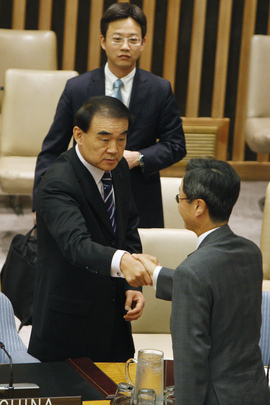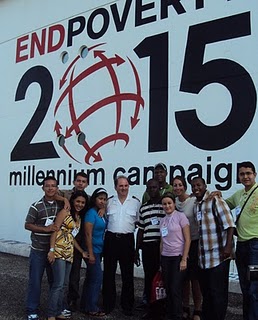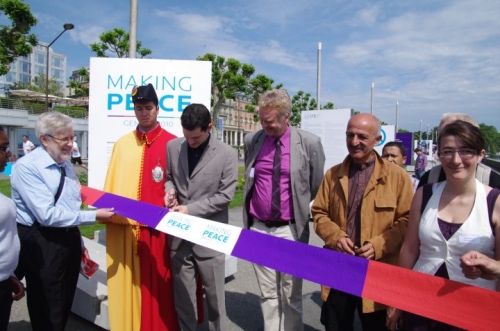| Organizers
|


|
|
|
Dear
Friends and Supporters of Article 9,
We
are pleased to send you some information about the Global Article 9
Campaign to Abolish War's recent activities and related developments.
|
THE CHEONAN INCIDENT THREATENS PEACE AND STABILITY IN THE KOREAN PENINSULA AND IN NORTHEAST ASIA
 On July 9, 2010, the UN Security Council issued a Presidential Statement on the Naval Vessel Cheonan condemning the attack and "stressing the importance of maintaining peace and stability on the Korean peninsula and in north-east Asia as a whole." On July 9, 2010, the UN Security Council issued a Presidential Statement on the Naval Vessel Cheonan condemning the attack and "stressing the importance of maintaining peace and stability on the Korean peninsula and in north-east Asia as a whole."
Acknowledging that "such an incident endangers peace and security in the region and beyond", the Council's statement "encourages the settlement of outstanding issues on the Korean peninsula by peaceful means to resume direct dialogue and negotiation through appropriate channels as early as possible, with a view to avoiding conflicts and averting escalation."
South Korean and Asian NGOs have welcomed such statement, notably for it echoes their concerns, as expressed in earlier communications to the Council.
Following such civil society's submissions to the UN, Seoul has issued inflammatory comments and exerted political, legal and financial reprisals against local NGOs for questioning Seoul's official line that blames North Korea for the Cheonan Incident.
In light of the situation, the Asian Human Rights Commission (AHRC) sent an open letter to the UN Secretary General denouncing the pressure brought to bear against dissenting voices.
The letter, dated June 25, commanded remarks made by UN Special Rapporteur on the promotion and protection of the right to freedom of opinion and expression Frank La Rue who expressed concerns at Seoul's National Security Act and called for "a culture of tolerance" to replace current defamation laws. Further, the AHRC called for "the abolition of the National Security Act and the decriminalization of defamation in the Criminal Code, as such provisions clearly run contrary to international human rights law and standards. "
In addition, the AHRC urged the UN Secretary General "to take all necessary steps to ensure that the reprisals, either directly or indirectly attributable to the government of the Republic of Korea, are immediately halted against civil society groups that have communicated with the UN" and called on the UN Security Council to request that Seoul "provide full explanations to clarify the substantive questions posed by the NGOs concerning the sinking of the Cheonan."
While the UN Security Council's statement does not go as far as answering the questions left open (notably identifying who was behind the attack), it does condemn it and acknowledges the gravity of the situation created by the Cheonan Incident and its significant repercussions on the security of the Korean Peninsula and the whole region.
Indeed, according to Wooksik Cheong of Peace Network, "the Cheonan Incident has the danger to trigger a new Cold War in Northeast Asia" with Washington and Tokyo actively supporting Seoul, while Pyongyang's long term's allies Beijing and Moscow are distancing themselves from the results of the Republic of Korea's investigation and warning against pushing North Korea into a corner.
He suggests not only re-opening the investigation to clarify the cause of the sinking and responsibilities in the incident, but also immediately resuming the Six Party Talks. "The Cheonan sinking demonstrates the necessity of building a peace regime and resuming the Six Party Talks to denuclearize the Korean peninsula. Now is the time to find the way to prevent a conflict on Korean peninsula and a new Cold War in Northeast Asia."
On 26 March 2010 an attack led to the sinking of a Republic of Korea naval ship, the Cheonan that resulted in the loss of 46 lives among the 104 personnel onboard. A joint civilian-military investigation conducted by the Republic of Korea with the participation of international experts from the US, UK, Australia and Sweden concluded that a North Korean torpedo sank the ship. North Korea has denied responsibility for the attack and many observers from within the Republic of Korea and internationally have questioned the conclusions of the investigation.
Indeed, several voices have been challenging the official version of events. In addition to South Korean opposition politicians, former military officials and civil society groups, some US-based Korean-born scientists are now questioning the conclusions of the Cheonan report by the Joint Investigation Group (JIG).
In a press conference held in Tokyo on July 9, Professor of Physics at the University of Virginia Lee Seung-Hun and Associate Professor in International Politics at Johns Hopkins University Suh Jae-Jung described how they have carried out their own careful examination of the JIG's report and concluded its findings were contradictory, inconsistent and unsustainable, stating there is "a very high chance" that some of the findings had been fabricated.
Lee and Suh joined their voice to international calls for a new investigation that would be objective and thorough and that would " reiterat[e] its commitment to peace and stability on the Korean peninsula."
Read the Asian Human Rights Commission's Open Letter to the UN Secretary General (June 25) here.
Find the full Investigation Result (June 4) on the Sinking of Republic of Korea
Ship Cheonan here.
Read the UNSC Presidential Statement (July 9) on the Sinking of the ROK Naval Vessel Cheonan here.
Read PSPD's Stance on the UNSC Presidential Statement (July 15) here.
Read Wooksik Cheong's analysis "The Cheonan Sinking and a New Cold War in Asia" here.
Read the summary of the press conference on the Cheonan Inconsistencies by Lee Seung-Hun and Suh Jae-Jung here.
Picture
credit: UN
Photo/Eskinder Debebe.
Ambassador
Li Baodong of China (centre) greets Ambassador Park In-Kook of the Republic of
Korea (right) during a Security Council meeting on the Cheonan warship sinking.
|
ALBA YOUTH REAFFIRMS ARTICLE 9
As part
of a joint project between Peace Boat and the Venezuelan Ministry of Foreign
Relations, a group of Latin American youth was invited to join the ship from
Venezuela to Guatemala to discuss the possibility of creating mechanisms to
further develop positive cooperation between the countries of Latin America and
the Caribbean.
 The ALBA
Youth Cruise for Latin America is a project named after the acronym of the
Bolivarian Alliance for the Peoples of Our America. It aims at developing a
network among young leaders in Latin America towards creating a more equal,
just and sustainable Latin America based on the idea of political, and economic
integration, as well as social justice. Further, it seeks to strengthen ties
and promotes international solidarity between Latin American youth and youth
from Asia, in particular from Korea and Japan. The ALBA
Youth Cruise for Latin America is a project named after the acronym of the
Bolivarian Alliance for the Peoples of Our America. It aims at developing a
network among young leaders in Latin America towards creating a more equal,
just and sustainable Latin America based on the idea of political, and economic
integration, as well as social justice. Further, it seeks to strengthen ties
and promotes international solidarity between Latin American youth and youth
from Asia, in particular from Korea and Japan.
Upon
completion of the program, participants from Bolivia, Dominica, Saint Vincent
and the Grenadines, Ecuador, Nicaragua and Venezuela issued what they called
the ALBA Youth Declaration, in which they expressed their support for "the
fight against military intervention [and] the preservation and re-establishment
of world peace".
In order
to achieve this goal, they underlined the "necessity to develop spaces,
agreements and alliances that strengthen the capacity to guarantee the
sovereignty of nations against foreign intervention" and explicitly looked upon
Article 9 of the Japanese Constitution as a means to "promote the creation and
maintenance of peaceful law in our countries, cities and communities where we
work and study."
Read the full ALBA Youth Declaration (in English, Spanish and Japanese) here.
Visit the Peace Boat's International Students' blog here and find more information about the ALBA Youth Cruise here.
| |
A STEP CLOSER TOWARDS AN ARMS TRADE TREATY
From July 12 to 23, 2010, UN member states gathered in New York for the first Preparatory Committee (PrepCom) for the UN Conference on the Arms Trade Treaty (ATT).
 The event was the first of a series of four towards a negotiating conference to be held in 2012 that will end with the adoption of a legally binding instrument regulating international arms transfers. Among the topics on the table were the scope, parameters, and implementation and application of such a treaty. The event was the first of a series of four towards a negotiating conference to be held in 2012 that will end with the adoption of a legally binding instrument regulating international arms transfers. Among the topics on the table were the scope, parameters, and implementation and application of such a treaty.
During the first morning, UN High Representative for Disarmament Affairs Sergio Duarte, reminded Member States they "have committed themselves to concluding a 'strong and robust' treaty, which provides assurances of a meaningful process." Throughout the PrepCom, Member States did reiterate their resolve to work towards concluding an ATT and indicated their support for the process. Less clear at this stage is whether the treaty will indeed be "strong and robust."
After two weeks of intense discussions, there seemed to be a general agreement that the future treaty should be broad in scope of what weapons and types of activities it will cover. Yet, disagreements remained when it came to the specifics of what types of weapons the treaty will regulate, and how far the instrument will go in not only preventing the illegal manufacture, transfer or the diversion of weapons to illicit actors but also the "legitimate" one, such as the production, import, export, transit and transaction of conventional weapons between governments.
While most delegations agreed that the treaty should cover the seven categories of conventional arms listed under the UN Register of Conventional Arms, plus small arms and light weapons and their ammunition, others claimed that expanding the scope of an ATT to all other conventional weapons was not realistic.
Some delegations called for the prohibition of arm transfers that would provoke conflict, prolong it, or be used to violate human rights or international humanitarian law, However, others insisted on the need to preserve their territorial integrity and warned against excessive international interference.
Despite these rhetorical differences, most delegations left with the feeling that an agreement could be found during the next sessions on the fundamental issues related to negotiating an Arms Trade Treaty, including its scope, objectives, and parameters.
The major disappointment of this first PrepCom was the fact that NGOs were prevented from observing crucial sessions of the negotiations. This exclusion came as a surprise to the many civil society representatives who flew to New York to advocate, especially as many Member States had emphasized the importance of openness and transparency in the process. Yet, it did not prevent NGOs to reminded states over and again that of their high expectations for a strong and robust treaty.
Several side events were held, during which NGO representatives made compelling presentations on the need, scope and content of the future Arms Trade Treaty, as well as its connection to human rights, international humanitarian law and development.
Among civil society that organized side events figured the NGO Committee on Disarmament, Peace and Security, Amnesty International, Oxfam, Saferworld, Small Arms Survey, IANSA and Instituto Sou da Paz to name just a few.
Calls for international regulations on the global arms trade go back a long way. In 2003, a group of NGOs launched the Control Arms Campaign. Since then, the idea of an Arms Trade Treaty has little by little garnered the support of a majority of UN Member States. In 2006, Argentina, Australia, Costa Rica, Finland, Japan, Kenya, and the United Kingdom introduced Resolution 61/89, "Towards an Arms Trade Treaty" at the UN First Committee, which started the process towards the elaboration of such an instrument.
The second PrepCom will be held in February-March 2011 to discuss "specific matters".
Visit the UN Arms Trade Treaty website here.
Read further news and analyses by Oxfam, Reaching Critical Will/WILPF and Global Action to Prevent War on their joint blog.
| | INTERNATIONAL PEACE BUREAU - MAKING PEACE
 From June 6 to July 4, the International Peace Bureau (an active supporter and partner of the Global Article 9 Campaign) held a month-long outdoor peace exhibition to celebrate the centenary of the Nobel Peace Prize awarded to the organization in 1910. From June 6 to July 4, the International Peace Bureau (an active supporter and partner of the Global Article 9 Campaign) held a month-long outdoor peace exhibition to celebrate the centenary of the Nobel Peace Prize awarded to the organization in 1910. The opening of the exhibition entitled « Making Peace » was part of a larger weekend program co-organized with the United Nations in Geneva, including the UN Environment Programme and the World Intellectual Property Organization.
Through
120 large size pictures by renowned photographers displayed along the
promenade on the Geneva lakeshore, IPB's exhibition documented a variety
of the last 100 years' peace struggles and paid tribute to the
international civil society movements that succeeded to put an end to
the apartheid regime, to ban antipersonnel landmines and to establish
the International Criminal Court (ICC), among other major contributions.
 An
international village made of tents and stands was created nearby the
Palais Wilson, the original headquarters of the League of Nations that
today hosts the office of the UN High Commissioner for Human Rights. The
themes covered the five main elements of peace: disarmament and
nonviolence; conflict prevention and resolution; economic and social
justice; human rights, law and democracy; as well as the environment and
sustainable development. An
international village made of tents and stands was created nearby the
Palais Wilson, the original headquarters of the League of Nations that
today hosts the office of the UN High Commissioner for Human Rights. The
themes covered the five main elements of peace: disarmament and
nonviolence; conflict prevention and resolution; economic and social
justice; human rights, law and democracy; as well as the environment and
sustainable development.
Among
the debates held was one on a subject central to the Global Article 9
Campaign: Disarmament for Development - co-organized by the
International Peace Bureau (IPB) and the Group for a Switzerland without
an Army (GSsA).
GSsA deplored the fact that officially, the Swiss military budget is
about two times the country's Official Development Assistance (in 2009,
4.5bio and 2.5bio respectively) - if not more: once the actual costs of
defense considered in their entirety, the ratio could in fact be as high as
4 to 1.
The
debate concluded with a call for better coordination between the
development movement and the pacifist one, so that the former dares to demand that governments tap into competing military budgets to fund
development while the latter expands their vision of a world without war
and include development in their quest for peace through human
security.
Read a brief report of the whole event and media coverage here.
Visit the exhibition's website here.
Pictures Credit: 24 heures |
|
|
|
|
Thank you for your interest in and support for the
Global Article 9 Campaign to Abolish War.
Peace,
|
Newsletter Editor:
Celine Nahory, International Coordinator
Global Article 9 Campaign to Abolish War / Peace Boat
|
|
|